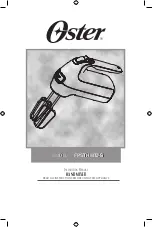
BTR-S
ERIES
O
PERATION
& M
AINTENANCE
M
ANUAL
12838 Stainless Drive, Holland, MI 49424
Phone: 616/399-5600 Fax 616/399-3084
Copyright 2018 BRAWN Mixer
www.BRAWNMIXER.com
Page 4 of 9
11/27/2018
ELECTRIC MOTORS
This equipment contains HAZARDOUS VOLTAGES,
ROTATING PARTS AND HOT SURFACES. SEVERE
PERSONAL INJURY OR PROPERTY DAMAGE CAN
RESULT IF SAFETY INSTRUCTIONS ARE NOT
FOLLOWED. Only qualified personnel should work on or
around this equipment after becoming thoroughly familiar
with all warnings, safety notices, and maintenance
procedures contained herein. The successful and safe
operation of this equipment is dependant upon proper
handling, installation, operation and maintenance.
WARNING
Explosion-proof motors-these motors are constructed to
comply with the U.L. Label Service Procedure Manual.
When repairing and reassembling a motor that has an
underwriter’s label, it is imperative that the unit be
reinspected and:
1. All original fits and tolerance be maintained.
2. All plugs and hardware be securely fastened.
3. Any parts replacements, including hardware, be
accurate duplicates of the originals.
Repair work on explosion-proof motors can only be done
by the original manufacturing or U.L. certified shops.
Violations of any of the above items will invalidate the
significance of the U.L. Label.
STORAGE
Motors must be stored in a clean, dry, well ventilated
location free from vibration and rapid or wide
temperature variations. If the unit is to be stored longer
than three months, consult factory. Ball bearing motors
are shipped from the factory properly lubricated and
ready to operate. When in storage, the motor shaft must
be turned several rotations every month and bearings
relubricated every year. On non-explosion-proof TEFC
motors, a removable plug in the bottom of the frame or
housing permits removal of accumulated moisture. Drain
regularly if storage atmosphere results in formation of
condensation.
INSTALLATION
Installation must be handled by qualified service or
maintenance personal.
OPERATION
CAUTION
Repeated trial starts can overheat the motor and may
result in motor burnout. If repeated trial starts are made,
allow sufficient time between trials to permit heat to
dissipate from windings and rotor to prevent overheating.
Starting currents are several times running currents, and
heating varies as the square of the current.
After installation is completed, but before motor is put in
regular service, make an initial start as follows:
1. Check motor starting and control device
connections against wiring diagrams.
2. Check voltage, phase, and frequency of line circuit
(power supply) against motor nameplate.
3. If possible, remove external load (disconnect drive)
and turn shaft by hand to ensure free rotation. This
may have been done during installation procedure;
if so, and conditions have not changed since, this
check may not be necessary.
a. If drive is disconnected, run motor at no load
long enough to be certain that no unusual
conditions develop. Listen and feel for
excessive noise, vibration, clicking, or
pounding. If present, stop motor immediately.
Investigate the cause and correct before
putting motor in service.
b. If drive is not disconnected, interrupt the
starting cycle after motor has accelerated to
low speed. Carefully observe for unusual
conditions as motor coasts to a stop.
4. When checks are satisfactory, operate at minimum
load and look for unusual condition. Increase load
slowly to maximum. Check unit for satisfactory
operation.
CAUTION
Guard against overloading. Overloading causes
overheating and overheating means shortened insulation
life. A motor subjected to a 10°C temperature rise above
the maximum limit for the insulation may cause the
insulation life to be reduced by 50%. To avoid
overloading, be sure motor current does not exceed
nameplate current when nameplate voltage is applied
.
Summary of Contents for 150644
Page 2: ...THIS PAGE IS INTENTIONALLY LEFT BLANK...
Page 4: ......
Page 27: ...THIS PAGE IS INTENTIONALLY LEFT BLANK...
Page 28: ......










































